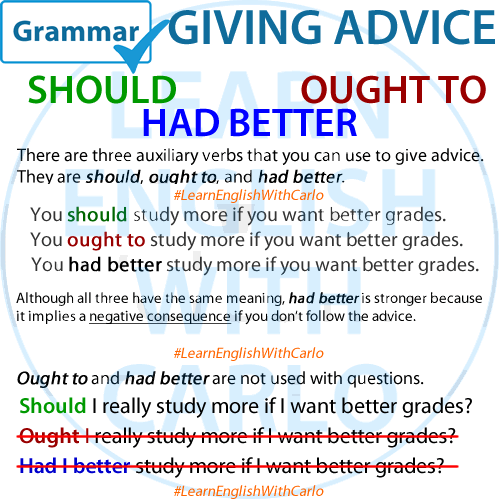
When giving advice in English, we often use the modal verbs “should,” “ought to,” and “had better.” Each of these has its nuances and specific contexts where they are more appropriate. Let’s explore how to use them, their differences, and how they work in questions and negative sentences.
Using SHOULD
“Should” is the most common modal verb for giving advice. It is used to suggest that something is a good idea or the right thing to do.
- Positive Sentences:
- You should eat more vegetables.
- She should call her parents more often.
- Negative Sentences:
- You shouldn’t eat too much sugar.
- He shouldn’t skip his classes.
- Questions:
- Should I bring an umbrella?
- Should we invite them to the party?
Using OUGHT TO
“Ought to” is very similar to “should” and can often be used interchangeably. However, “ought to” can sound slightly more formal or emphatic.
- Positive Sentences:
- You ought to see a doctor.
- They ought to apologize for their mistake.
- Negative Sentences:
- You ought not to (oughtn’t to) smoke so much. (Note: “ought not to” is less common and can sound a bit formal or old-fashioned)
- She ought not to lie to her friends.
- Questions:
- Ought I to finish this report today? (Less common and sounds formal)
- Ought we to help them with their project?
Using HAD BETTER
“Had better” is used to give strong advice or warnings. It implies that there will be negative consequences if the advice is not followed.
- Positive Sentences:
- You had better finish your homework before going out.
- He had better take an umbrella; it looks like rain.
- Negative Sentences:
- You had better not be late for the meeting.
- She had better not forget to call her mom.
- Questions:(Not commonly used in questions)
- Hadn’t you better go now? (This form is quite rare and sounds old-fashioned)
Differences Between SHOULD, OUGHT TO, and HAD BETTER
- Formality and Emphasis:
- “Should” is neutral and commonly used in everyday conversation.
- “Ought to” is slightly more formal and emphatic.
- “Had better” is used for strong advice or warnings, indicating possible negative consequences.
- Usage in Negative Sentences:
- “Should” and “shouldn’t” are commonly used.
- “Ought not to” is grammatically correct but less commonly used.
- “Had better not” is the standard form for negative sentences with “had better.”
- Usage in Questions:
- “Should” is commonly used in questions.
- “Ought to” can be used in questions but sounds formal.
- “Had better” is rarely used in questions and sounds old-fashioned when it is.
Examples in Context
- Should:
- Positive: “You should read this book; it’s really good.”
- Negative: “You shouldn’t stay up too late.”
- Question: “Should I wear this dress to the party?”
- Ought to:
- Positive: “You ought to respect your elders.”
- Negative: “You ought not to interrupt when someone is speaking.”
- Question: “Ought we to check the weather before leaving?”
- Had Better:
- Positive: “You had better lock the door when you leave.”
- Negative: “You had better not forget your passport.”
- Question: “Hadn’t you better get started on your assignment?” (Rare and old-fashioned)
Conclusion
Using “should,” “ought to,” and “had better” correctly can help you give advice more effectively in English. Remember that “should” is the most versatile and commonly used, “ought to” is slightly more formal, and “had better” is used for strong advice or warnings. Practice using them in different contexts to become more comfortable with their nuances!
